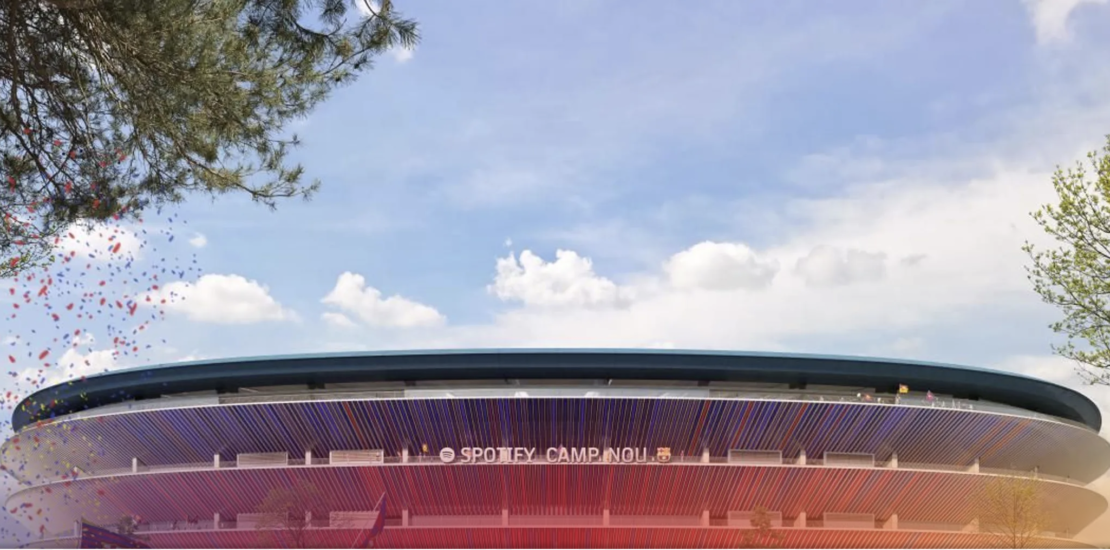- October 26, 2023
- Posted by: SportsV
- Categories: Featured Articles, Features, Home News, Industry News, News, Press Releases

Work on Spotify Camp Nou is progressing well and has entered a new stage. Speaking at the recent Ordinary General Assembly, FC Barcelona vice-president Elena Fort said “we still have a long way to go, but we are well under way.”
Fort reviewed all the work the club has done since signing the agreement with Barcelona City Council and B:SM for the move to the Estadi Olimpic Lluís Companys until November 2024.
The third tier had already been demolished during the period when La Liga was paused for the FIFA World Cup last year, and then construction contracts were signed for both Spotify Camp Nou and Montjuïc, and the Barça Immersive Tour opened its doors in June, which Fort insists “is a very important project for everyone at the club, a groundbreaking museum that will be the basis of the future Spotify Camp Nou and that helps us to tell our story to everyone who comes to visit us.”
As for the schedule for the Espai Barça, Fort explained:
We can assure you that we have all the permits to be able to start the final works and to be able to finish the stadium.
She thanked Barcelona City Council for all their support with getting the licence approved, the result of the joint efforts with municipal experts and the Espai Barça team. Likewise, with the demolitions already practically completed, the bulk of the work will proceed with the development of the foundations, as well as the construction of the new third tier, including the two hospitality rings.
Fort confirmed:
In November 2024, we will return to Spotify Camp Nou with an approximate capacity of 65,000 spectators between the first and second tiers, with 50% of the VIP capacity and the definitive museum open. The bulk of all the work will be carried out in 2024, including the core main structure and the roof.
Positive experience at Estadi Olímpic Lluís Companys
As for the temporary transfer to the Lluís Companys Olympic Stadium, Fort is very positive, with fans “filling the stadium, and for us it is essential that it is full to support the team”.
She also made it clear that the team and coaching staff are very happy too. As part of the transfer of use of the facility agreed with Barcelona City Council through the company Barcelona de Serveis Municipal (BSM), manager of the Olympic Stadium, the club had to carry out works to adapt the stadium to the club’s needs and to the requirements of La Liga and UEFA.
Spaces that have particularly undergone transformation are the hospitality rooms, the ticket office, the press boxes, the changing rooms and the pitch, as well as aspects related to drainage, irrigation and the water treatment system, including a new water tank, as well as all the broadcasting systems.
FC Barcelona has teamed up with Legends International to promote the design and marketing of the future VIP boxes and seats at the renovated Spotify Camp Nou, the epicentre of Espai Barça, as Ted Glick discussed with the 400+ C-suite attendees during the 2023 ALSD International Conference at The Etihad Stadium.
First sustainability report published
FC Barcelona has published its Sustainability Report for the 2020/21 and 2021/22 seasons that brings together the various activities and policies carried out by the Club in areas such as finance, management, sport, society and the environment. Sustainability is one of the three pillars of the 2021-2026 Strategic Plan and in line with that approach Barça are working to promote sustainability in all its activities.
Organisations have to adapt strategically and operationally to respond to current challenges set by trends in sustainability. As such, to respond to market and social needs and given the organisational complexity and the variety of activities carried out by FC Barcelona, the Club decided to develop a Strategic Plan in which sustainability was one of the key principles.
The Club is committed to the 2030 Agenda and the Sustainable Development Objectives, which are built into the organisation’s activities as well as being guided by the GRI (Global Reporting Initiative) and ISO (International Organization for Standardization) indicators.
In the light of the above, and to integrate across the Club this strategic and operational decision in different projects and transitional activities, the organisation now has a specific Sustainability Department, which works with the other departments at the Club. As such, the widening and strengthening of FC Barcelona’s activities with regards to sport, society, finance and the environment have been key in the 2020/21, 2021/22 and 2022/23 seasons.
First analysis of materiality
To complement this new strategy and after studying the strong and weak points, as well as the Club’s experience with regards to relevant international sustainability standards and good practice by other leading sports clubs, the Club began in the 2021/22 season to execute its first materiality analysis in FC Barcelona history. This process led the Club to identify areas of economic, social, environmental and governmental impact in which the organisation participates as priorities for FC Barcelona’s sustainability strategy.
With the results of the analysis, the Club has put together a series of operational and functional strategies that are the foundation for the development of the strategic plan for sustainability in its widest sense and the application of standards in areas of society, the environment, finance and government. Based on these strengths FC Barcelona has developed its plan of action.
Challenges successfully met
Amongst the challenges met over the two seasons, the two Biosphere certificates stand out as recognition that the Club and the Museum develop their assets and services in line with a responsible model for society and the environment. FC Barcelona has also received the BREEAM certificate for the Espai Barça project, a recognition that verifies the Club has met, so far, the requisites for sustainable urban development set out by BREEAM @ES URBANISMO.
It is also worth mentioning the support and promotion for the women’s professional teams, as well as the updating of the Ethical Code, the improvement in Compliance policies, which during the 2021/22 and 2020/21 seasons were updated to bring significant improvements, bringing them inline with policies meeting standards UNE 19601.
Other activities include participation in Global Sustainability Benchmark in Sports, within the financial area four collections of material from the Club’s facilities have been carried out to give them a second life, reduction of electricity consumption via the installation of LED bulbs and the use of electricity from 100% renewable resources.
For the upcoming challenges set by the Club and its Sustainability area, key areas include calculating the Club’s CO2 footprint, the recovery of concrete from the third tier of the current Spotify Camp Nou to recycle it for future use in the Espai Barça project and the continuing implementation of measures to save energy, water and reduce waste amongst others. Similarly, FC Barcelona as a whole is committed to diversity and inclusion and sees improvements in accessibility, services and digital areas as a challenge with the goal being to offer a better service to all people.
Source & imagery, courtesy: FC Barcelona


